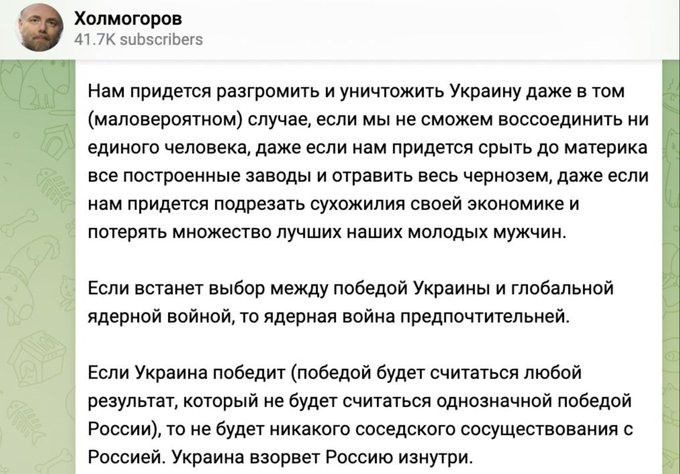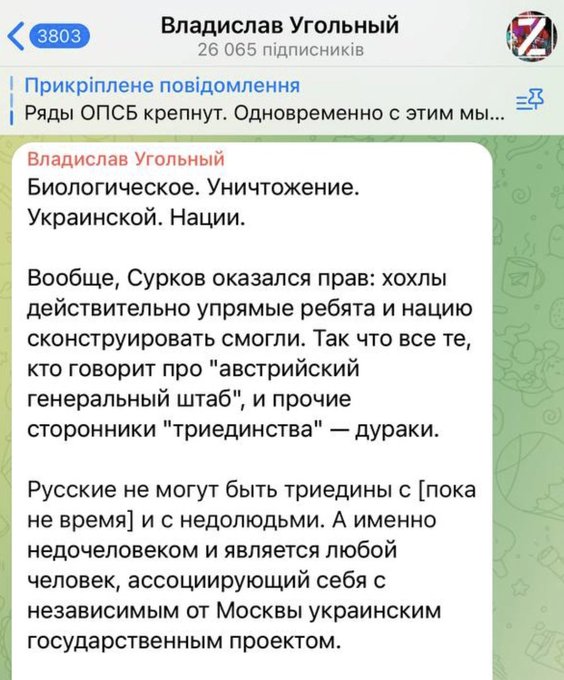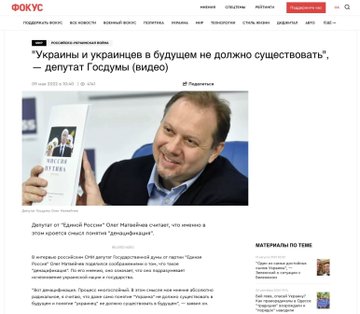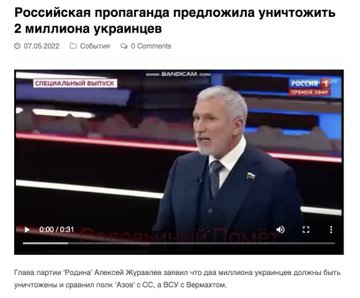Month: September 2022
The West has no alternative
Russian President Putin today announced a partial mobilization, insisted on referenda in the territories Russia occupies in Ukraine, as a prelude to annexation, and threatened the West with nuclear weapons. In the wake of Ukraine’s successful offensive in the northeast region of Kharkiv, Moscow is doubling down.
No surprise, but still signficant
Putin’s speech is no surprise. He desperately needs more cannon fodder to fight in Ukraine. He has likely lost to death and injury about 75,000 troops in 7 months, more than America’s losses in both Afghanistan and Iraq over 20 years. The referenda had been scheduled previously and postponed due to the precarious military situation. Putin has previously threatened the use of nuclear weapons.
But the message is wider than any of these items. Putin is preparing to sacrifice the entire Russian army to gain a few provinces in Ukraine. He sees himself at war not only with Ukraine but with the West, which he blames for provoking him into attacking Ukraine. After months of telling the Russian people they could continue their normal lives during his Special Military Operation, now he is asking for extraordinary sacrifices.
Not much there there
A lot depends on how the Russian’s citizens react. So far, most have ignored the war, while some have fled Russia and others have urged Putin on and even volunteered for service in Ukraine. The reservists Putin is calling up may or may not appear for duty. The sanctions, which so far have caused relatively little real pain, may begin to bite. But the Russian pain threshold is high. They’ve had a lot of practice.
There is no doubt about the outcome of the referenda. Putin doesn’t believe in real choice when voting. They are nevertheless important, as once Moscow annexes the Russian occupied territories Putin will claim they are integral parts of the Russian Federation. Ukrainian attacks will therefore provoke a less “special operation” response.
The nuclear weapons threat is an empty one. Ukrainian forces aren’t concentrated in ways that would make them vulnerable to giant explosions. If nevertheless Putin proceeded, he should understand the Western response would be disproportional and devastating.
The best outcome is Russian defeat
Putin’s speech leaves the West with little alternative. Restraining the Ukrainians now would no doubt please Putin, but it wouldn’t get him withdraw. Pushing the Russians back to the February 23 lines would no longer be a satisfactory outcome. From the Western perspective, the best outcome of this dreadful war is a complete and unequivocal Russian defeat.
That is possible. The Ukrainians have shown skill and determination under extraordinarily difficult conditions. The Russian hold on Donetsk is precarious. Kherson is vulnerable.

Another major loss of territory like the blue area near Kharkiv would dramatically undermine Putin’s credibility. So too would a split in the territory the Russians control along the Sea of Azov.
Ukrainians have the initiative
Winter is coming, but there are still several months of fighting season ahead. The Ukrainians have seized the initiative. They merit wholehearted support against an enemy that calls them Nazis but itself resembles the Third Reich moving into the Sudetenland. Putin, unlike Hitler, is losing his war of aggression. That’s good. The West has no alternative but to support his opponents.
Stevenson’s army, September 21
– David Ignatius says UN is getting things right.-
– SAIS Prof Hal Brands says Russia & China are gaining in the global South.
– Russians think they can win in Ukraine.
– Eliot Cohen wants more aid to pressure a cornered Putin. [FWIW, I think Cohen ignores the dangers of a nuclear confrontation.]
– WSJ has long article arguing that a “ragtag army” stopped the Russian attack on Kyiv.
– CSIS promotes its “Civics for Adults.”
– JCS history office says concerns about repealing “Don’t Ask, Don’t Tell” proved unfounded.
– House GOP split on spending bill. Senate likely to take up NDAA in rare October session.
My SAIS colleague Charlie Stevenson distributes this almost daily news digest of foreign/defense/national security policy to “Stevenson’s army” via Googlegroups. I republish here. To get Stevenson’s army by email, send a blank email (no subject or text in the body) to stevensons-army+subscribe@googlegroups.com. You’ll get an email confirming your join request. Click “Join This Group” and follow the instructions to join. Once you have joined, you can adjust your email delivery preferences (if you want every email or a digest of the emails).
Stevenson’s army, September 19
– Biden & WH repeat contradictions over Taiwan.
– DOD probes clandestine psych operations.
– DOD tries to limit use of Chinese parts.
My SAIS colleague Charlie Stevenson distributes this almost daily news digest of foreign/defense/national security policy to “Stevenson’s army” via Googlegroups. I republish here. To get Stevenson’s army by email, send a blank email (no subject or text in the body) to stevensons-army+subscribe@googlegroups.com. You’ll get an email confirming your join request. Click “Join This Group” and follow the instructions to join. Once you have joined, you can adjust your email delivery preferences (if you want every email or a digest of the emails).
Stevenson’s army, September 18
– NYT says Biden resists sending longer range missiles to Ukraine.
– NYT says autocrats are gaining in Central America.
– Here’s a link to a 2013 study of how Members of Congress spend their time.
– And, if true, a very sad phone call.
My SAIS colleague Charlie Stevenson distributes this almost daily news digest of foreign/defense/national security policy to “Stevenson’s army” via Googlegroups. I republish here. To get Stevenson’s army by email, send a blank email (no subject or text in the body) to stevensons-army+subscribe@googlegroups.com. You’ll get an email confirming your join request. Click “Join This Group” and follow the instructions to join. Once you have joined, you can adjust your email delivery preferences (if you want every email or a digest of the emails).
No, it’s not ending until Zelensky says so
Ukraine has won back substantial territory in Kharkiv province in the past 10 days or so. They snookered the Russians into thinking the offensive would come in the south. Moscow moved many of its best troops there, leaving the northeast ill defended. And in recent days both China President Xi and India’s Prime Minister Modi have scolded Russian President Putin, suggesting he should sue for peace. This has made some wonder if the end of the war is near.
Location, location, location
The short answer is no. Russia still has vast resources of men and materiel to throw at the Ukrainians. Putin might like a ceasefire to give himself some time and space to resupply. But that is a far cry from readiness to negotiate a serious settlement. Nor are the Ukrainians interested in allowing the Russians to stay on their territory. President Zelensky has made it clear he is fighting for 100% of his 2014 pre-invasion sovereign territory. He will come under pressure from the Europeans and Americans to accept a ceasefire if Russia is rolled back to the lines of February 23.
Identity, identity, identity
I doubt even then Zelensky will be tempted to stop if his forces are still moving in the right directions. The war has vastly increased his own popularity, from a nadir a year or two after his election. He would be risking disappointment on the home front if he stopped the war before regaining as much territory as possible.
Ukrainians have gained a far stronger sense of national identity than appeared to exist before the war. This is what happens when you kill people because of their identity. It reinforces that identity among those who remain alive. Ukrainians know that the discourse in Russia is genocidal.
How would you feel if you were Ukrainian?
Stéphane Siohan tweets some compelling examples:
#Ukraine I am not sure that Europe and the world understand the nature of the genocidal discourse about Ukraine circulating in the Russian information space. Read the following excerpts. — THREAD (1)
Telegram channel of the journalist Ehor Holmogorov: “We will have to crush & destroy #Ukraine even if we have to tear down all their factories and poison all the black soil, even if we have to cut the tendons of our economy and lose many of the best our young men.” (2)

Journalist Ehor Holmogorov: “If the choice is between a Ukrainian victory and a global nuclear war, then a nuclear war is preferable. If Ukraine wins , then there will be no neighborly coexistence with Russia. Ukraine will blow up Russia from within (3)
Vladislav Ugolnyi, Russian publicist: “Biological destruction of the Ukrainian nation. Russians cannot be live in unity with subhumans. Namely, any person who associates himself with a Ukrainian project independent of Moscow is a subhuman.” (4)

Russian Duman MP Oleh Matveychev: “Ukraine and Ukrainians should not exist in the future.” The head of Russian party “Motherland”, Alexei Zhuravlev, proposes to “destroy two million Ukrainians”.


A hard winter of cold and deprivation could temper Ukrainians’ enthusiasm for continuing the war. But until it does the Russians have little hope of convincing Ukrainians that they would be better off negotiating than continuing the fight.
Russia thinks it has better odds with the Europeans
The Russians think some in the European Union are likely to cry uncle before the Ukrainians do. But the situation there isn’t as bad as it might appear. Those whom Russia most directly threatens will remain stalwart. Estonia, Latvia, Lithuania, and Poland know that they are next if Putin succeeds in Ukraine. Sweden and Finland have abandoned neutrality and stand with NATO. Germany is vulnerable because of its reliance on Russian gas, but Berlin appears to have made progress in avoiding a catastrophe when Moscow cuts it off during the winter. France depends far less on Russian gas but President Macron fancies himself a skilled mediator. He isn’t likely to succeed in that role. Gas prices have hit the UK economy hard, but it has been a strong and constant supporter of Ukraine.
Are the Americans soft?
President Biden has so far been rock solid in backing Ukraine with money, arms, and diplomatic support. There are however on both right and left in the US Congress some who are less committed and even a few who implicitly back Russia. That perspective has had little traction with the American people. But it is possible, if the economy dips into recession, that doubts will grow. There is also a portion of the American foreign policy establishment that worries about the impact on Russia of a defeat. Some prefer the devil they know, especially if he has nuclear weapons.
But Biden sees Ukraine as a main theater of conflict with autocracy. Were the Ukrainians to lose, or settle for an agreement that leaves Russian troops on their soil and ready to make war again in the future, it would look as if autocracy had won. He is unlikely to yield until compelled.
Stevenson’s army, September 17
Celebrate the signing of our foundation document in 1787.
Legal historian Jack Rakove notes that Madison favored a Senate based on population, not two per state. [Of course, he was from a big state.]
NYT has long piece with data showing how the US system deviates from representing public opinion.
Charlie Savage has new documents showing DOJ legal opinions on war powers.
In 60 Minutes interview, Biden warns Russia of Ukraine escalation.
Economist says Poland is opening a canal to bypass Kaliningrad.
My SAIS colleague Charlie Stevenson distributes this almost daily news digest of foreign/defense/national security policy to “Stevenson’s army” via Googlegroups. I republish here. To get Stevenson’s army by email, send a blank email (no subject or text in the body) to stevensons-army+subscribe@googlegroups.com. You’ll get an email confirming your join request. Click “Join This Group” and follow the instructions to join. Once you have joined, you can adjust your email delivery preferences (if you want every email or a digest of the emails).




 RSS - Posts
RSS - Posts
